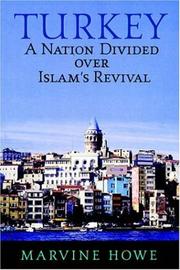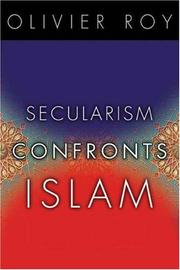| Listing 1 - 10 of 54 | << page >> |
Sort by
|
Book
ISBN: 9789085063704 Year: 2011 Publisher: Amsterdam Boom
Abstract | Keywords | Export | Availability | Bookmark
 Loading...
Loading...Choose an application
- Reference Manager
- EndNote
- RefWorks (Direct export to RefWorks)
Welke bijdrage kan de islamitische traditie leveren aan de democratische samenleving in Nederland? In 'Islam in Nederland' denken intellectuelen met een christelijke en een islamitische achtergrond na over deze vraag. De auteurs gaan in op de integratie van moslims en de vraag in welke zin de islam een democratische cultuur uitsluit. Maar zij verkennen ook moslimvisies op de relatie tussen mensen en God, tussen individu en samenleving, tussen autonomie en gehoorzaamheid. Het gaat ze er daarbij niet om 'de' islam te bespreken, maar om te laten zien hoe de islam aan het maatschappelijk gesprek kan bijdragen. Met bijdragen van Mohamed Ajouaou, Erik Borgman, Abdelilah Ljamai, Sajidah Abdus Sattar, Pim Valkenberg, Hasan Yar.
Islam --- Netherlands --- Islam and secularism --- 297 <492> --- Secularism and Islam --- Secularism --- Islam. Mohammedanisme--Nederland
Book
ISBN: 9781474409216 1474409210 9781474409223 1474409229 9781474418799 1474418791 9781474409209 1474409202 Year: 2022 Publisher: Edinburgh
Abstract | Keywords | Export | Availability | Bookmark
 Loading...
Loading...Choose an application
- Reference Manager
- EndNote
- RefWorks (Direct export to RefWorks)
This book offers a comparative and cross-cultural history of Islamic reform and European colonialism as both dependent and independent factors in shaping the multiple ways of becoming modern in Indonesia and Malaya during the first half of the twentieth century.
Islam --- Mohammedanism --- Muhammadanism --- Muslimism --- Mussulmanism --- Religions --- Muslims --- History --- Islam and secularism. --- Relations. --- Secularism and Islam --- Secularism
Book
ISBN: 9812308903 981230889X 9814459372 Year: 2009 Publisher: Singapore : Institute of Southeast Asian Studies,
Abstract | Keywords | Export | Availability | Bookmark
 Loading...
Loading...Choose an application
- Reference Manager
- EndNote
- RefWorks (Direct export to RefWorks)
"This is an excellent book which will have a major impact on the current debate about the relationship between Islam and politics in Indonesia. Its greatest strength is its innovative characterization of three Indonesian Muslim models of polity, as opposed to the normal two, Islamic state and secular state. Assyaukanie brilliantly delineates a third model, which he calls the Religious Democratic State, in the process greatly clarifying our understanding of the previous models, which he now proposes to label the Islamic Democratic State and the Liberal Democratic State. Another strength of the book is methodological. Each of its arguments is solidly grounded in the thoughts and actions of particular players, Indonesian Muslim thinkers and activists." - Professor R. William Liddle, Ohio State University, United States of America
Islam and state --- Islam and secularism --- Islam and secularism. --- Secularism and Islam --- Secularism

ISBN: 0813342422 081333764X Year: 2000 Publisher: Boulder, Colo. Westview
Abstract | Keywords | Export | Availability | Bookmark
 Loading...
Loading...Choose an application
- Reference Manager
- EndNote
- RefWorks (Direct export to RefWorks)
Islam --- Politics --- Turkey --- 32 --- 297 --- Turkije --- Politiek --- Islam and secularism --- Islam and state --- Secularism and Islam --- Secularism
Book
ISBN: 9780822359555 9780822359982 9780822375135 0822359553 0822359987 Year: 2015 Publisher: Durham Duke University Press
Abstract | Keywords | Export | Availability | Bookmark
 Loading...
Loading...Choose an application
- Reference Manager
- EndNote
- RefWorks (Direct export to RefWorks)
Islam and secularism --- Islam --- 297*35 --- Secularism and Islam --- Secularism --- Islam en het Westen --- 297*35 Islam en het Westen
Book
ISBN: 0824893034 0824878124 0824878116 0824878035 Year: 2019 Publisher: Honolulu : University of Hawaii Press,
Abstract | Keywords | Export | Availability | Bookmark
 Loading...
Loading...Choose an application
- Reference Manager
- EndNote
- RefWorks (Direct export to RefWorks)
One of the great transformations presently sweeping the Muslim world involves not just political and economic change but the reshaping of young Muslims’ styles of romance, courtship, and marriage. Nancy J. Smith-Hefner takes up the personal lives and sexual attitudes of educated Muslim Javanese youth in the city of Yogyakarta to explore the dramatic social and ethical changes taking place in Indonesian society. Drawing on more than 250 interviews over a fifteen-year period, her vivid, well-crafted ethnography is full of insights into the real-life struggles of young Muslims and framed by a deep understanding of Indonesia’s wider debates on gender and youth culture.The changes among Muslim youth reflect an ongoing if at times unsteady attempt to balance varied ideals, ethical concerns, and aspirations. On the one hand, growing numbers of young people show a deep and pervasive desire for a more active role in their Islamic faith. On the other, even as they seek a more self-conscious and scripture-based profession of faith, many educated youth aspire to personal relationships similar to those seen among youth elsewhere—a greater measure of informality, openness, and intimacy than was typical for their parents’ and grandparents’ generations. Young women in particular seek freedom for self-expression, employment, and social fulfillment outside of the home. Smith-Hefner pays particular attention to their shifting roles and perspectives because it is young women who have been most dramatically affected by the upheavals transforming this Muslim-majority country. Although deeply personal, the changing aspirations of young Muslims have immense implications for social and public life throughout Indonesia.The fruit of a longitudinal study begun shortly after the fall of the authoritarian New Order government and the return to democracy in 1998–1999, the book reflects Smith-Hefner’s nearly forty years of anthropological engagement with the island of Java and her continuing exploration into what it means to be both “modern” and Muslim. The culture of the new Muslim youth, the author shows, through all its nuances and variations, reflects the inexorable abandonment of traditions and practices deemed incompatible with authentic Islam and an ongoing and profound Islamization of intimacies.
Muslim youth --- Islam and secularism --- Attitudes. --- Sexual behavior --- Secularism and Islam --- Secularism --- Islamic youth --- Youth, Muslim --- Youth
Book
ISBN: 9783030946692 Year: 2022 Publisher: Cham Springer International Publishing :Imprint: Springer
Abstract | Keywords | Export | Availability | Bookmark
 Loading...
Loading...Choose an application
- Reference Manager
- EndNote
- RefWorks (Direct export to RefWorks)
Secularism. --- Social policy. --- Islam and secularism. --- Secularism and Islam --- Secularism --- National planning --- State planning --- Economic policy --- Family policy --- Social history --- Ethics --- Irreligion --- Utilitarianism --- Atheism --- Postsecularism --- Secularization (Theology)

ISBN: 9780231141024 0231141025 9780231511797 0231511795 Year: 2007 Publisher: New York Columbia university press
Abstract | Keywords | Export | Availability | Bookmark
 Loading...
Loading...Choose an application
- Reference Manager
- EndNote
- RefWorks (Direct export to RefWorks)
French Secularism and Islam - Fundamentalism. --- Fundamentalism --- Islam and secularism --- Islam and state --- Islam --- Laicism --- 297 --- 301.188.4 --- 297.11 --- Mosque and state --- State and Islam --- State, The --- Ummah (Islam) --- Secularism and Islam --- Secularism --- Christian fundamentalism --- Protestant fundamentalism --- Religious fundamentalism (Protestantism) --- Protestantism --- Theology, Doctrinal --- Evangelicalism --- Millennialism --- Modernist-fundamentalist controversy --- 297.11 Islam: godsdienstfilosofie --- Islam: godsdienstfilosofie --- Sociologie van de godsdienst --- History
Book
ISBN: 9780415781466 0415781469 9780415781473 0415781477 9780203841822 0203841824 1136901434 1282930052 9786612930058 9781136901386 9781136901423 9781136901430 1136901426 Year: 2011 Publisher: Abingdon, Oxon, England New York Routledge
Abstract | Keywords | Export | Availability | Bookmark
 Loading...
Loading...Choose an application
- Reference Manager
- EndNote
- RefWorks (Direct export to RefWorks)
This comprehensive survey of contemporary Islam provides a philosophical and theological approach to the issues faced by Muslims and the question of global secularisation. Engaging with critics of modern Islam, Shabbir Akhtar sets out an agenda of what his religion is and could be as a political entity. Exploring the views and arguments of philosophical, religious and political thinkers, the author covers a raft of issues faced by Muslims in an increasingly secular society. Chapters are devoted to the Qur'an and Islamic literature; the history of Islam; Sharia law; political Islam; I
Islam and culture. --- Islam and politics. --- Islam and secularism. --- Religion and politics. --- Political science --- Politics, Practical --- Politics and religion --- Religion --- Religions --- Secularism and Islam --- Secularism --- Islam --- Politics and Islam --- Culture and Islam --- Culture --- Islamic civilization --- Religious aspects --- Political aspects
Book
ISBN: 0195698851 9780195698855 Year: 2008 Publisher: New Delhi Oxford University Press
Abstract | Keywords | Export | Availability | Bookmark
 Loading...
Loading...Choose an application
- Reference Manager
- EndNote
- RefWorks (Direct export to RefWorks)
Chiefly with reference to India and also on Islam and secularism; papers presented at a seminar organized by the South Asian Studies Council, Yale University during March 26-27, 2004.
Secularism --- Islam and secularism --- 316:2 <540> --- Ethics --- Irreligion --- Utilitarianism --- Atheism --- Postsecularism --- Secularization (Theology) --- Secularism and Islam --- 316:2 <540> Godsdienstsociologie--India --- Godsdienstsociologie--India --- Secularism - India - Congresses --- Islam and secularism - Congresses
| Listing 1 - 10 of 54 | << page >> |
Sort by
|

 Search
Search Feedback
Feedback About UniCat
About UniCat  Help
Help News
News